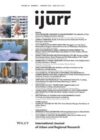Over the past decade, a growing housing and urban studies literature has engaged with the Lefebvrian concept of the ‘right to the city’. Central to this are rights, laws and grassroots demands. Emerging literature has also focused on the practical side of the right to the city as a set of actions to undo exclusion and dispossession. In this article I highlight this practical side by presenting the underexposed case of anti-caravan politics in the Netherlands as a concrete struggle for inclusive spaces. For over a century, Dutch caravan dwellers (from mainly Traveller and Sinti backgrounds) have seen their housing culture oppressed, stigmatized and even diminished. Since 2018, however, explicit anti-caravan politics have been abolished, yet little has been done to cater to the needs of caravan-dwelling communities. In this article I consider these communities’ expressed aspirations and demands as articulations of the ‘practical’ right to the city.
‘In the [municipal] Caravan Affairs [woonwagenzaken] commission, public servants patronize us, saying that a new campsite is too expensive, and, at most, they could add some pitches to existing sites … When I opposed their plans, one of them asked, ‘Are you skilled and educated enough to be so certain about this?’ He probably thought that we [i.e. Travellers] know less. But it’s our struggle. We live the reality we are talking about. We live for our children, families and community members. We feel this life and know where it’s going wrong’
(interview with Lucas, Traveller, 60–64 years, November 2021).
